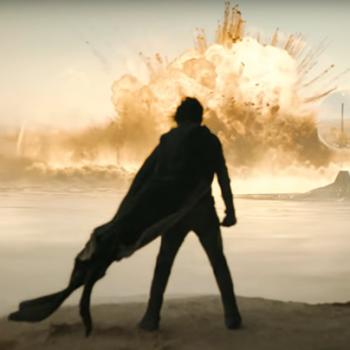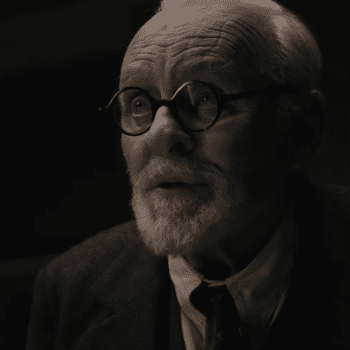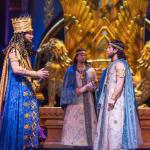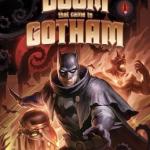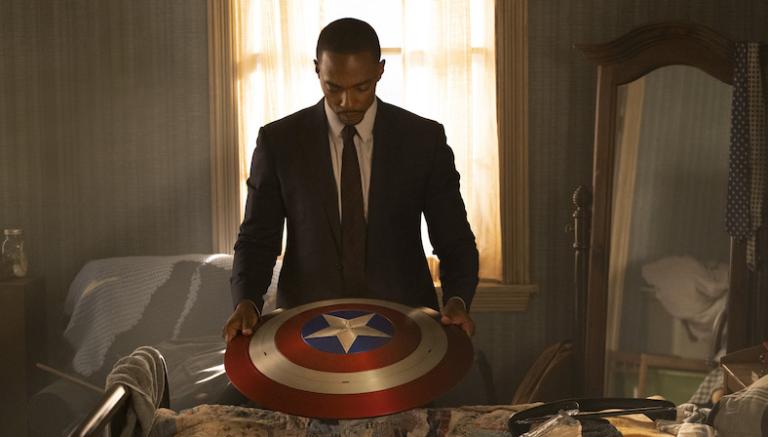
Turkish Delight.
It’s a candy, of course—a mixture of sugar and starch and tasty bits of flavor that have been made in Turkey since it was known as the Ottoman Empire. In “The Whole World is Watching,” the fourth episode of Disney+’s The Falcon and the Winter Soldier, Baron Zemo (played by Daniel Brühl) used it to discover the whereabouts of Karli Morgenthau, leader of the anti-nationalist group called the Flag Smashers.
But for anyone with a familiarity with C.S. Lewis’ classic fantasy series The Chronicles of Narnia knows Turkish Delight for another reason: It’s an instrument of temptation. And temptation, of course, is what this episode was all about.
Turkish Delight gets a whole chapter to itself in Lewis’ The Lion, the Witch and the Wardrobe. In it, Edmund Pevensie—following his younger sister, Lucy, through a magical wardrobe—finds himself in the snowy land of Narnia, where he meets its beautiful-if-chilly ruler, the White Witch.
Now, the Witch has been concerned with a prophecy involving “two sons of Adam and two daughters of Eve” for an awfully long time, and she’s very interested when Edmund tells her about his two sisters and older brother. She wants to get Edmund to betray his siblings. And to bring Edmund under her spell (quite literally) she serves him enchanted Turkish Delight. Lewis writes that “anyone who had once tasted it would want more and more of it, and would even, if they were allowed, go on eating it till they killed themselves.”
The Turkish Delight that Zemo offers Sam (Falcon, played by Anthony Mackie) and Bucky (Winter Soldier, played by Sebastian Stan), as well as some local kids, isn’t enchanted. But Zemo is indeed a little like the White Witch—a duplicitous rascal who’s playing his own game while “helping” Sam and Bucky play theirs. Sam and Bucky know they’re working with a devil—one with a yen for purple, not white.
But more importantly, the Turkish Delight opens the wardrobe door to another Narnia story—one that tells us how the White Witch came to be and that points directly to the new Captain America, John Walker (Wyatt Russell).
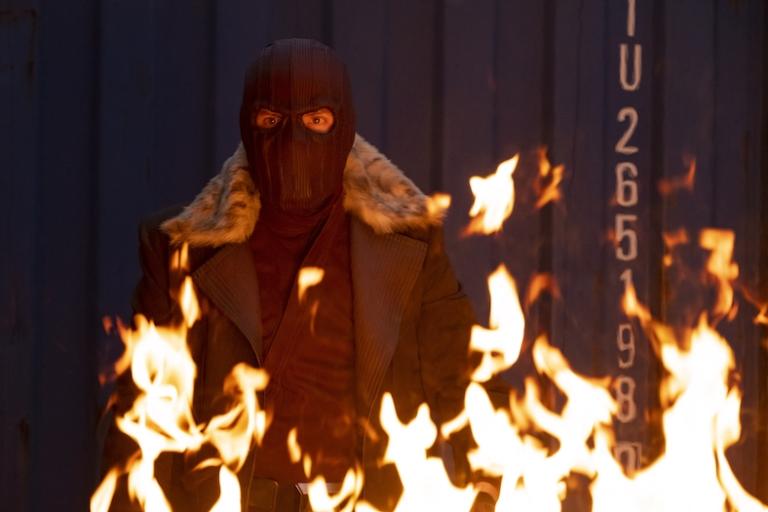
The Wood Between the Worlds
In The Magician’s Nephew, Lewis takes us to Narnia’s very first days—and its creation by the great lion Aslan. Two children, Polly and Digory, two kids from England, are there to watch, and they accidentally bring Jadis—the last ruler of the ruined land of Charn—into the fresh new world, too.
This is a big deal, and Aslan’s not happy about Jadis’ sudden arrival (which was Digory’s fault). He knows that the queen means trouble. But he says that a magical tree can protect Narnia from her villainy for a good long while. Digory, Aslan says, must retrieve an apple from another magic tree, located far, far away: Pick an apple, plant it in Narnia and the land will be protected—for a while.
Digory and Polly dutifully go to retrieve the apple, and they find it in a walled garden with a golden gate. And by the gate, Digory reads this:
Come in by the gold gates or not at all
Take of my fruit for others or forbear,
For those who steal or those who climb my wall
Shall find their heart’s desire and find despair.
The story obviously echoes another famous story—that of the Garden of Eden. Here, Jadis plays the Serpent: Before Digory and Polly got there, she climbed the wall, ate an apple and knows the fruit’s secrets—that it’s the key to getting whatever your heart desires. She tells Digory as much. And for Digory, the knowledge of what the apple can do becomes an awful temptation: He knows that one bite of the apple could cure his deathly ill mother. All he needs to do is take an apple for himself and zip back to his own world instead of ferrying it to Aslan.
Jadis—in a very Baron Zemo-like way—pushes him.
“And what would your Mother to think if she knew that you could have taken her pain away and given her back her life and saved your Father’s heart from being broken, and that you wouldn’t—that you’d rather run messages for a wild animal in a strange world that is no business of yours?”
The snippet of dialogue reminds me of what John Walker’s best bud, Lemar Hoskins, said when the two talked about whether they would’ve used the super-soldier serum (which gives its recipients superhuman strength and speed). Lemar says he absolutely would’ve used the serum if he had a chance—and that John would be a wildly worthy recipient. Think about all the lives we could’ve saved, Lemar says.
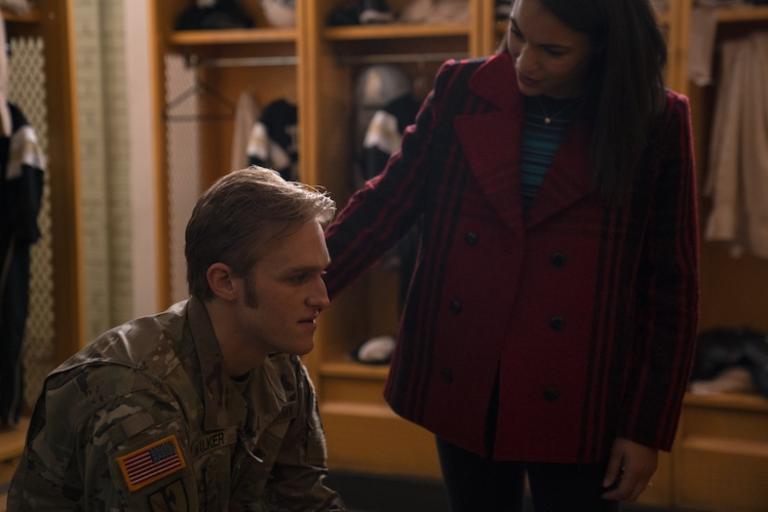
Deep Magic
But the serum, like the apple, can corrupt. The entire episode spends a lot of time framing the serum not as a cure-all, but a temptation. Sam says he never would’ve taken the serum. But John … he listens to Lemar. And, like Aravis, he eventually steals the forbidden fruit for himself.
In The Magician’s Nephew, that dynamic is key, whether the apple is stolen or given. Jadis swiped and ate the apple and got what she wanted: power. John got his power, too.
But Aslan warns of the consequences. “The fruit always works,” he says in The Magician’s Nephew. “It must work—but it does not work happily for any who pluck it at their own will.” If Digory had taken an apple back to his mother, yes, she would’ve gotten better—but both, eventually, would agree that it would’ve been better if she had died instead. If some well-meaning Narnian had stolen a fruit for the very altruistic purpose of protecting Narnia, it would’ve indeed protected Narnia—but Narnia itself would’ve been corrupted, turning into a land much like Charn.
That adds a fascinating wrinkle to the saga of John Walker, given that he himself is intended as a reflection of a country that’s lost its way a bit; the image-bearer for a set of ideals that doesn’t seem so idyllic anymore. Despite all his strength, John’s arrogance and rage threaten to turn this hero into a villain. And just as his power has grown 20-fold with the serum, so have his flaws. The bloodstained shield we see at the end of the episode scream to that sad truth.
We can already see the curse of the “forbidden fruit” take hold.
Again and again, the show pounds on one important drum: Who is worthy to hold the shield?
John Walker desperately wants to be worthy. Often, he seems like a pretty good guy. But while the original Captain America, Steve Rogers, was given the serum, Walker steals it. It points to a critical difference between the two Caps. And it reminds us that Sam not only would’ve refused the serum if offered to him, but that he gave up the shield, too.
Those who give power away are the people worth holding it, The Falcon and the Winter Soldier tells us. Those who take it … well, Aslan would have something to say about that, as well.




